Book Fox
Oh you know, long time reader, first time blogger...just a place to throw out some ideas, be a little snarky, give some honest opinions about books and the book industry.
I swore off vampire novels...

...I did!
Though Bone Season might loosely be considered a vampire novel. Oh sure, the author doesn't call them that...but they're vampires. Pretty, though mostly ruthless, vampires.
The Quick does not have pretty vampires. I appreciate that. Even my most favorite vampire novel, Sunshine by Robin McKinely, for all the protestations that the lead vampire was gray-skinned and absolutely inhuman, features a rather drool-worthy love interest. (Oh, now I feel horrible--Robin McKinley does not write anything like a simpering paranormal romance. She's far more complex than that. Seriously, every time I reread one of her books, I some nuance I missed before.)
But The Quick's vampires are definitely not pretty. A few are sympathetic, of course, but they are not about sexuality, repressed or otherwise. Instead they are everything a flesh and blood human being is not. They are without passion, perpetually bored, perpetually disgusted with the humanity that surrounds them. A few of them decide they should coldly and cruelly 'improve' their society, but of course, without actual love for society, any effort to improve it will fail. They cannot change, they cannot grow. (I'm not sure, but they might be Republicans...)
All in all, it's a refreshing change from the vampire fare that floods the bookstores right now.
I haven't said much about the plot, and I won't. As my Random House sales rep said, 'You think it's about something, and then you say, no, it's about this, and then a few chapters later you've figured out that it's about something else entirely.' In a nutshell it's about a secret vampire society in Victorian London, but that doesn't tell you much. I will say that the ending is quite satisfying while leaving the door open for more.
I'm very early on this review (my arc doesn't even have cover art)...it doesn't come out until June 2014. But put it on your list and lose yourself for a couple days in some great literature of the macabre.
Not my baguette...

I picked this up because I was going camping and needed something light-ish in ARC form, so if anything happened to it, I would not be out a book that I had actually paid money for. Also, I am a mystery buyer who does not read mysteries, and occasionally I feel guilty about that.
If you're interested in twisty international thrillers, this is actually right up your alley. I have no qualms about recommending it (ah, the ethics of bookselling: I don't like it, but you will!).
The plot was unpredictable, the main character inventive, and the translation was probably pretty good (though, I'm no real judge on this one). It's just not something I would choose under different circumstances.
Here's my dillemma..
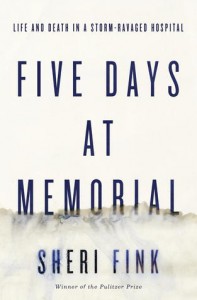
How do you review a book that you believe is important--as in, everyone who even hopes to call themselves a concerned citizen, anyone running for public office, and any one who ever expects to be hospitalized at some point in their life should read--but by the last page you kinda went, 'Meh'?
After starting, deleting, and restarting this review several times, I realized what the problem was. This is really two books. One I was fascinated by, and the other I didn't really care about.
The five days of the title refers to the five days of Katrina and it's immediate aftermath, at a for-profit hospital in New Orleans (why the 'for-profit matters later). Memorial was surrounded by floodwaters, lost power, had no concrete plan for rescue, and at the end of those five days had a larger than average death-rate. After investigation, many of the dead, who had largely been patients of an independent hospice-program within the bounds of Memorial, were discovered to have been injected with morphine and sedatives in much higher than normal doses.
The second half of the book was essentially a true crime story (though with the added nuance of discussing the prickly topic of euthanasia & and the culpability of medical personnel in emergency situations), detailing the investigation of Memorial, it's staff, and it's corporate overlords. In the end a doctor and two nurses were arrested for second-degree murder.
I will admit that I was bored by this. The workings (or failings) of the legal system do not really interest me, and Fink's efforts to show all sides left me not even caring about the actual people involved. I would have welcomed more commentary about medical ethics, but since this was a book about a particular event and not about the issue itself, I suppose the insights of any but those involved would have been out of place.
What I do find fascinating is the psychology of crises--who lives, who dies, who fails, who thrives, who rises to the occasion, and who...takes hits of oxygen in a functioning part of the building while elsewhere in the hospital patients gasp for breath because there is no power for their ventilators.
Fink only briefly covers it, but there was another hospital in New Orleans that lost only 3 patients. They were a charity hospital with twice the patients (incluiding psychiatric patieints), used to improvising with somewhat substandard equipment. That staff understood that just because it was a crisis didn't mean that the rules changed. Their primary mandate was to care for their patients, and to that end, they took care of themselves. They kept a regular sleep schedule. They kept up with all care--even non-essentials like physical thereapy. They organized morale boosters like a talent show by flashlight. Instead of going to their cars to sit in the air conditioning for a few minutes, they siphoned gas to keep their generators going. They never surrendered to the situation. They never believed that anyone--even the sickest--weren't going to get out alive.
So the first part of Five Days at Memorial is a play by play (more or less) of those five days. Do not doubt that there were heroes working at Memorial (just like there were probably cowards and troublemakers at Charity Hospital). But what comes across is a complete lack of leadership.
Their owner, Tenet, who owns many for-profit hospitals in the US, made only the most cursory attempts at any disaster preparedness plan before Katrina, and (much like the government) failed to react to the scale of the situation fast enough. And when they did, this huge corporation decided to rely on the government for rescue, despite offers from within their own family of hospitals to send helicopters and take patients.
On the ground, Memorial staff chose to triage their patients in such a way that the most fragile and vulnerable would be slated for rescue last. It was the opposite of what Charity Hospital decided. It might have made sense in other situations--a sinking ship with only so many lifeboats--but not in a time and place where rescue might be slow, but it was coming. There wasn't a shortage of food or supplies. The pharmacy ran low, but a shipment made it through early on. There was even a working generator in another part of the building.
But they gave up. They assumed there was nothing they could do but wait for rescue, and so they tried nothing. And in the end, because though without sense they were not without compassion, several doctors and nurses made the choice to 'ease the suffering' of some of their patients in an unfortunately irrevocable way.
So it's an important book. It's just not exactly what I wanted it to be.
I finally did it.
I swore I would wait until the series was finished, but I got sucked into the HBO series and I had to know more. What can I say, I'm weak. And because of that same weakness, you will not read a ridiculously over the top oh-my-gods-i-love-this review. You can see the stars. You know I like it. You don't read 5000 pages over the course of 5 weeks without loving something.
But I'm smarting right now because I desperately want to know what happens, which is what I knew would happen. You didn't need to stare into the fires of R'hllor to see that coming.
And now I am bereft. It's that emptiness that only readers know. You finish something you could have spent your whole life immersed in, but now it's over (at least for another 5 years or so, right, George?), and you don't quite know what to do with yourself. Another fantasy (except for some established favorites) would be like drinking Budweiser after indulging in World Wide Stout. Moving to another genre like switching to some sugary cocktail. They might stave off the DTs, but they don't feel right either.
I suppose I could watch the series again, but let's face it, even this marvelous adaptation can't contain the massiveness of Martin's creation.
No, I'm left with no other choice but the bracing cold shower of non-fiction. My favorite fantasy author bar none (sorry George), Terry Pratchett, once suggested that the best thing an aspiring author can do (and no, I haven't quite given up that dream), is read as much, on as many different subjects, as you can.
So here I go: Five Days At Memorial is next.
 1
1
This should be a movie. Now.
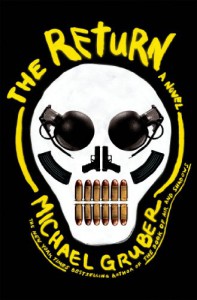
It's usually a red flag for me when I immediately picture actors while I'm reading a book. It often means that what the author has given us is something derivative of other novels or movies or TV shows.
And yes, that is pretty much what Gruber gives us...and it is magnificent.
Richard Marder is an average guy, or so his children think. But really, he's an ex-solider who invested at the right time, and now that he's diagnosed with an aneurism that could pop at any moment, he's taking himself, his money, a camper, a load of guns & his crazy war buddy down to Mexico for some old-fashioned revenge. Simple as that.
He's a pretty uncomplicated hero (how rare is that--and how rare to be written so well that you really do root for him from beginning to end without getting sick of him), and you love him, and you love what he's doing (it's not all revenge). You keep saying, this guy can't be real, but wow, I wish he was.
In other words, this book is FUN. It's pure joy to read. And it will make a wonderful movie with George Clooney and Jackie Earle Haley.
Not your average Austen reimagining

I was in high school when A&E's Pride and Prejudice debuted (conveniently enough for my AP English teacher), so there was no way I was not going to fall in love with Austen.
Since then I've seen most of the film adaptations, reread the books several times (if it's been a while for you, yes, the dialog is as witty as you remember from the films), and dabbled in the many, many, many reimaginings (with and without zombies) and sequels that have come along in the last decades. I blame Colin Firth. Some of these are more worthy than others.
Here is one that is.
I surprised it took so long in the wake of Downton Abbey to write P&P from the perspective of the servants. Actually, that's not really what this is. Instead it is a fully realized & original story of servants that happen to work for the Bennetts. Obviously you see all your favorite characters (sometimes more sympathetically and sometimes not), but the bulk of the story deals with the previously unknown servants, and through their eyes you get a glimpse of what's going on in the world away from the ballrooms and parlors of genteel female society. In other words, it's a harsher story than P&P, and the stakes are higher than not getting asked to dance, but don't worry, it's still a love story at heart, and if you love P&P, you will enjoy this.
Oh, Genre, there's a reason you get no respect...
I'm a genre buyer--that is, I buy genre books for the store I work for. Occasionally, I even buy them and read them for myself. (For those of you who don't know--and I wouldn't write this if I didn't work with a lot of book people who don't get it either--'genre' is a loose term that covers mystery, romance, horror, western, sci-fi, and fantasy.)
I've never been much of a mystery reader: I don't like the idea of the author holding something over me. Who said every book is a mystery? It's true, every author reveals or hides information to create tension and keep you reading. But mystery writers demand that you acknowledge their incredible skill in not letting you know the butler did it. It's annoying.
But the others, I've read more than my fair share of them. Even that least-respected Romance category. Whether a space opera or a retold fairy tale or a hard-boiled detective story, the best are marvels of character and plotting that let you escape your ho-hum life for a little while.
But since becoming a Buyer with a capital B, I've found myself feeling more disdain than love. If you've ever said to yourself, I could write this, well, you probably could.
I'm ordering Penguin mass market right now (or should be...this kind of work requires frequent breaks). Penguin...oh wait, it's Penguin Random House now...Penguin Random House is the king of cozy mysteries. I don't know who reads these...to me they even seem too tepid for grandmothers (who in my bookstore experience lean more towards what one called 'hard romance'.)
Many of them are 'first in a brand new series!' from authors that may or may not be debut authors (even if they claim they are), and follow roughly the same formula: widowed/divorced/newly single middle-aged woman moves to small town Colorado/Amish County/her hometown where she decides to open up a coffee/antique button/repair shop. Shortly after her coffee/antique button/repair shop opens, she creates an enemy whose corpse she finds two day later. Now she must investigate with her cat/aunt's ghost/sentient armoire to clear her name.
If it's a contemporary romance, substitute hot fireman for corpse.
But my point is, and I'm not the first lit-snob to make it, that there's so damn much of it. And they're all the same. Author after author, series after series, season after season. There's a popular sentiment among Buyers and sales reps that 'Books aren't widgets'. That is, each book is unique and must be taken on it's own terms. You can't strictly adhere to a budget because the product is radically different with each season. Similar books will sell radically differently. One book works. The next doesn't.
And mostly that's true. But not in Genreland. Here, I can say, 'How do we sell Amish mysteries? How do we sell urban fantasies? What did this author's last book do?' and I know exactly how many to order.
It's soul-sucking.
So, when you see a genre book in my blog here, it's because something about it popped. Maybe the cover. Maybe our publisher rep said something intriguing about it. Maybe it reminds me of a simpler time when I could read books just for fun and not with the idea that I'll need to write a review for it.
Okay, this wasn't supposed to be a 'Well, if I review a book, it must be good' sort of post. Not at all. I'm the worst bookseller ever because I assume that what I like isn't necessarily what you'll like, and I'm not going to engage with you about it. (Maybe that's why they finally gave me a job off the floor.)
Nope the point of this post was to claim a little of my soul back.
The Humans
 The premise is scifi (an alien double comes to earth to stop the spread of a mathematical proof that will allow humans to advance too quickly for their--or the universe's--good), but this is definitely literature. Although it seems trite--our alien narrator of course learns what's so wonderful (and painful) about being a messy, flawed human--this is beautiful, powerful, and FUNNY stuff.
The premise is scifi (an alien double comes to earth to stop the spread of a mathematical proof that will allow humans to advance too quickly for their--or the universe's--good), but this is definitely literature. Although it seems trite--our alien narrator of course learns what's so wonderful (and painful) about being a messy, flawed human--this is beautiful, powerful, and FUNNY stuff.
 1
1
Dodger
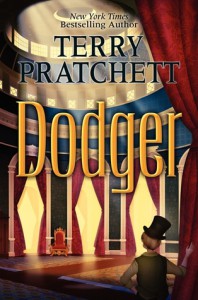 While it's not Discworld, it is Pratchett, which means it's an intelligent, well-plotted, frequently hilarious novel.
While it's not Discworld, it is Pratchett, which means it's an intelligent, well-plotted, frequently hilarious novel.
The Wise Man's Fear (Kingkiller Chronicles Series #2)
 Ugh. Name of the Wind was a fabulous, detailed, rich beginning to a promising fantasy series. Wise Man's Fear is slow, indulgent, and ultimately pointless. It makes me fear that Rothfuss has no idea where he's going with this.
Ugh. Name of the Wind was a fabulous, detailed, rich beginning to a promising fantasy series. Wise Man's Fear is slow, indulgent, and ultimately pointless. It makes me fear that Rothfuss has no idea where he's going with this.
Sea Creatures
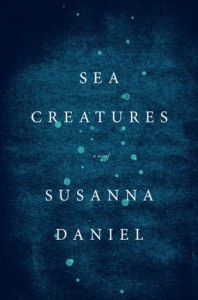 Domestic dramas aren't my cup of tea, but it was past time I read a book for my good friend Kate McCune, so I picked it up.Gerogia is an insomniac, and met her husband at a sleep lab. He has parasomnia--a debilitating condition of marked by episodes of sleepwalking and night terrors. Their young son, Frankie, once developing normally, has stopped talking. Following a disgrace in Chicago, the three move back to Georgia's hometown of Coral Gables, Florida. There she begins a job as an errand girl/assistant for 'the hermit'--a friend of her deceased mother who, after losing his daughter, abandons his wife and moves to a stilt house in the Keys. Through her relationship with the hermit and the absence of her husband, Georgia slowly begins to realize the hard choices she will have to make in order to protect her son.Daniel weaves a marvelous sense of place with a deft handling of relationships, loss, and hope to make this a fully realized and riveting drama.
Domestic dramas aren't my cup of tea, but it was past time I read a book for my good friend Kate McCune, so I picked it up.Gerogia is an insomniac, and met her husband at a sleep lab. He has parasomnia--a debilitating condition of marked by episodes of sleepwalking and night terrors. Their young son, Frankie, once developing normally, has stopped talking. Following a disgrace in Chicago, the three move back to Georgia's hometown of Coral Gables, Florida. There she begins a job as an errand girl/assistant for 'the hermit'--a friend of her deceased mother who, after losing his daughter, abandons his wife and moves to a stilt house in the Keys. Through her relationship with the hermit and the absence of her husband, Georgia slowly begins to realize the hard choices she will have to make in order to protect her son.Daniel weaves a marvelous sense of place with a deft handling of relationships, loss, and hope to make this a fully realized and riveting drama.
Never Look a Polar Bear in the Eye: A Family Field Trip to the Arctic's Edge in Search of Adventure, Truth, and Mini-Marshmallows
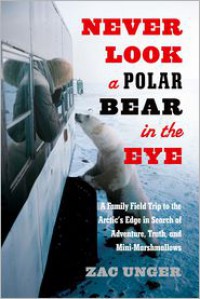 Good fun. At times scathing in it's critique of ecotourism (you flew HOW many miles to see this endangered species) and the many people who claim an intimate connection with enormous predators. But at heart, Zac Unger is a regular guy who wants to do what he can for the environment and to know that it is actually going to make a difference.
Good fun. At times scathing in it's critique of ecotourism (you flew HOW many miles to see this endangered species) and the many people who claim an intimate connection with enormous predators. But at heart, Zac Unger is a regular guy who wants to do what he can for the environment and to know that it is actually going to make a difference.
Life After Life
 The idea of getting a do-over in life is fertile territory for an author. You die, and then somehow you wake up again and get the chance to do it right this time. Add in a time and place--say, Britain in the decades leading up to World War II. Now the question is not only getting your personal life right, but perhaps being able to change the course of history itself. All of this has the makings for a very good novel, but in the hands of Kate Atkinson, it becomes something extraordinary. Her protagonist is Ursula. Sometimes Ursula dies at birth, sometimes she dies in childhood, sometimes she lives a full life--happy or otherwise--but she always starts over, slowly accumulating the the shades and shadows of her other lives. And soon, often without knowing why, she begins to act on those inklings. Atkinson's storytelling is subtle and complex,and her evocation of a time and place remarkable. This is the must-read of the year.
The idea of getting a do-over in life is fertile territory for an author. You die, and then somehow you wake up again and get the chance to do it right this time. Add in a time and place--say, Britain in the decades leading up to World War II. Now the question is not only getting your personal life right, but perhaps being able to change the course of history itself. All of this has the makings for a very good novel, but in the hands of Kate Atkinson, it becomes something extraordinary. Her protagonist is Ursula. Sometimes Ursula dies at birth, sometimes she dies in childhood, sometimes she lives a full life--happy or otherwise--but she always starts over, slowly accumulating the the shades and shadows of her other lives. And soon, often without knowing why, she begins to act on those inklings. Atkinson's storytelling is subtle and complex,and her evocation of a time and place remarkable. This is the must-read of the year.
Amity & Sorrow: A Novel
 Amity and Sorrow are sisters, stolen away by their mother, Amaranth, from the only home they've ever known--the compound of their father's polygamous cult in the Idaho panhandle. After four days of driving, Amaranth crashes their car in Oklahoma, where all three are reluctantly taken in by a dogged descendant of the Dust Bowl. While the sisters and their mother struggle in their new surroundings, Amaranth's story of what drove her into the cult and what ultimately drove her away is unfurled in a series of harrowing flashbacks. This is a deft debut told with great compassion and insight. The characters are compelling, the dialog pitch-perfect, and the settings haunting.
Amity and Sorrow are sisters, stolen away by their mother, Amaranth, from the only home they've ever known--the compound of their father's polygamous cult in the Idaho panhandle. After four days of driving, Amaranth crashes their car in Oklahoma, where all three are reluctantly taken in by a dogged descendant of the Dust Bowl. While the sisters and their mother struggle in their new surroundings, Amaranth's story of what drove her into the cult and what ultimately drove her away is unfurled in a series of harrowing flashbacks. This is a deft debut told with great compassion and insight. The characters are compelling, the dialog pitch-perfect, and the settings haunting.
The Passage (Passage Trilogy Series #1)
 Ambitious, certainly, and having finished it in less than a week, it doesn't seem like a 770-some-page book. The structure, I think was something of a problem, particularly the break from the first section/timeframe to the second. All of the sudden the chracters we care about aren't even referenced (one of them doesn't return until the very end, and then only...briefly). The colony-world was well-fleshed out. It was particularly refreshing that the society of the colony was neither naively harmonic nor oppresively discordant. They certainly have their problems--the same problems you get whenever you throw humans together--but that's not necessarily the point of the book. It's about the ending and saving of the world. It's an adventure. And not a bad one.
Ambitious, certainly, and having finished it in less than a week, it doesn't seem like a 770-some-page book. The structure, I think was something of a problem, particularly the break from the first section/timeframe to the second. All of the sudden the chracters we care about aren't even referenced (one of them doesn't return until the very end, and then only...briefly). The colony-world was well-fleshed out. It was particularly refreshing that the society of the colony was neither naively harmonic nor oppresively discordant. They certainly have their problems--the same problems you get whenever you throw humans together--but that's not necessarily the point of the book. It's about the ending and saving of the world. It's an adventure. And not a bad one.








